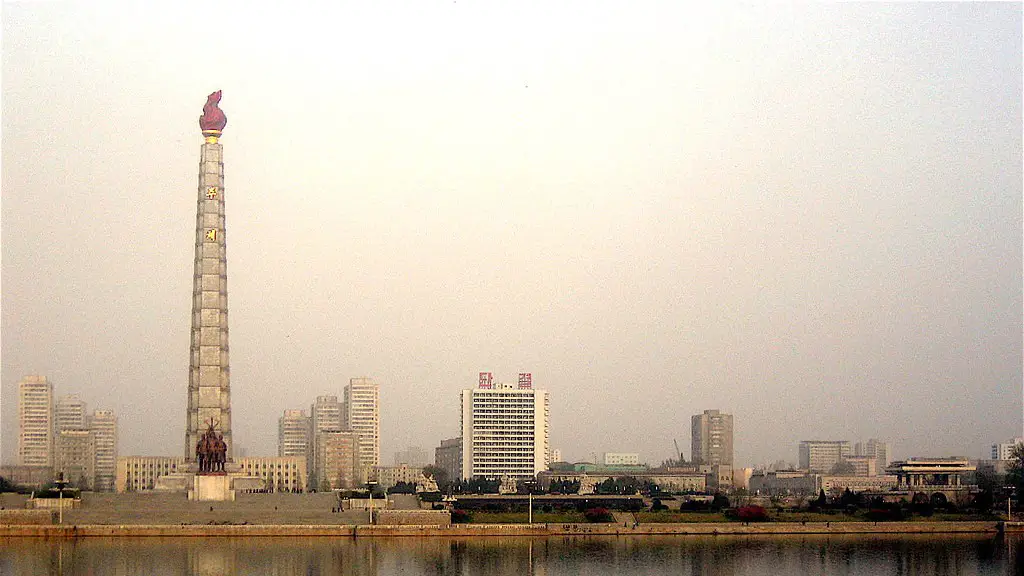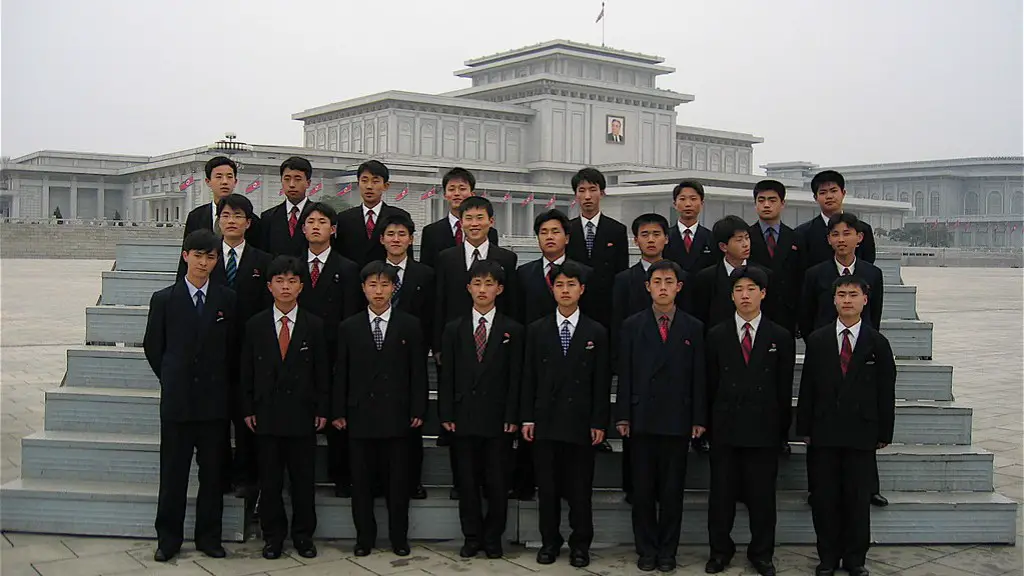North Korea is a highly controversial and secretive nation that has long been a source of fear and mistrust in the international community. It has an extremely volatile relationship with its neighbour, South Korea, and the two countries have never agreed on the status of a reunified Korean peninsula. This volatile environment is not helped by a series of threats and actions from North Korea, which suggests it wants war with South Korea.
North Korea is incredibly isolated from the rest of the world. It has had a ruthless and oppressive regime in power for several decades, and its leaders have a history of making threats towards nations it considers to be hostile. It recently accused South Korea of “committing hostile acts” and has even suggested launching a pre-emptive nuclear strike against the South.
North Korea’s motives for wanting war with South Korea are difficult to determine. It could be a show of strength to the world, or a way to distract its own citizens from the unpopularity of the government. It may also be based on a fear of further economic isolation or a desire to reclaim territory held by South Korea.
The international community has a way of responding to North Korea’s threats. It has placed several economic sanctions on the country, including the stoppage of trade and travel. The UN Security Council has also condemned North Korea’s belligerent rhetoric and provocative behaviour.
The threat of war is a highly dangerous situation, and the consequences of it could be disastrous. It would undoubtedly cause massive disruption, increased international tension and an escalation of violence. The potential of a nuclear attack adds an additional level of risk.
Experts believe the best way to avoid war is for international leaders to engage in direct dialogue with North Korea and find a diplomatic solution to the conflict. This could involve the international community offering incentives for good behaviour and providing resources and aid to the North Korean citizens.
However, North Korea has shown no sign of backing down from its hostile rhetoric, making it difficult for the international community to reach a diplomatic resolution.
North Korea’s New Weaponry
North Korea has also been steadily increasing its military capabilities over the years. It has invested heavily in its arsenal and has developed several advanced weapons systems, such as nuclear missiles and long-range artillery. It has also been accused of cyber warfare, such as hacking into rival countries’ computer systems.
North Korea’s weapons, combined with its belligerent rhetoric, suggest the country is a serious threat to world peace. It has the potential to cause serious destruction, especially if it were to use nuclear weapons.
Some experts believe North Korea’s weapons of mass destruction are simply being used as a bargaining chip to gain political leverage. However, its aggressive stance towards South Korea makes it difficult to know what its true intentions are.
The fact that North Korea is a secretive and reclusive nation makes it difficult to understand its motivations and how it intends to use its weapons. This makes it impossible to predict how it will respond to any new measures taken by the international community, and increases the risk of conflict.
Deterrent Actions by South Korea
South Korea has taken several steps to defend itself against North Korea’s threats. It has set up the Korean Central Intelligence Agency (KCIA) to monitor North Korean activities, and deploys its forces at the demilitarized zone between the two countries.
The South Korean government also has a defence agreement with the US, which allows US troops to be stationed on its soil. The US is also able to provide additional forces in the event of a conflict, making it a useful deterrent against North Korean aggression.
However, these measures alone may not be enough to prevent a war. South Korea needs to take further steps and improve its defences even further if it is going to be successful in deterring North Korea’s aggression.
The South Korean government has also been trying to reach out to North Korea. It has made several attempts at diplomacy, but these efforts have been largely unsuccessful due to North Korea’s reluctance to engage in dialogue.
The South Korean government has also been taking a proactive stance by developing its own weapons systems and boosting its military capabilities. This has been met with strong condemnation from North Korea, which has accused South Korea of preparing for war.
Failed Attempts at Diplomacy
The international community has made several attempts to negotiate with North Korea and encourage it to end its hostile stance towards South Korea. This has included the Six-Party Talks and numerous other international diplomatic initiatives.
However, these attempts have been largely unsuccessful due to North Korea’s unwillingness to make any concessions. This has led to a stalemate in the situation and left the international community with few options to resolve the crisis.
The US has taken a particularly strong stance against North Korea and has imposed its own sanctions on the country. It has also been a vocal critic of North Korea’s bellicose behaviour and has threatened military action if the regime continues its sabre-rattling.
The US’s hard line approach has been met with criticism from some countries, who believe it is exacerbating the situation. They argue that it is counterproductive and ultimately makes it harder to negotiate a peaceful resolution.
The international community has also put pressure on China to play a more active role in managing the tensions between North Korea and South Korea. China is North Korea’s closest ally, and has the most influence over it. China has taken some steps to try and rein in North Korea’s behaviour, but it has been largely ineffective.
The Risk of War
The risk of war between North Korea and South Korea is a very real one. North Korea’s belligerent rhetoric and its development of advanced weapons systems suggest that it is serious about the threat of war. The international community must continue to take strong action to prevent this from happening.
The best way to prevent a war is for the international community to reach a diplomatic solution. This involves engaging in direct dialogue with North Korea and finding ways to incentivise it to end its aggression.
South Korea also has to take steps to protect itself and be ready to respond if necessary. This includes strengthening its military capabilities, developing weapons systems and improving its defences.
The international community must also continue to pressure China to take a more active role in managing the situation, and to use its influence to encourage North Korea to take a more diplomatic approach. Until then, the risk of war will remain, and the world will have to wait and see what North Korea’s next move will be.
The Impact of War
If a war were to happen, it would have an incredibly destructive impact and could cause serious disruption in the region. South Korea would bear the brunt of the destruction, and it could take decades for it to recover from the devastation.
The economic consequences of war would be catastrophic. Trade and travel would be heavily disrupted, and the economic impact would be felt throughout the region. It could also have a long-term impact on the global economy.
The instability in the region would also have a significant effect on the US and China, who both have a vested interest in the region. A war would seriously undermine their efforts to promote peace and stability in East Asia.
The international community must continue to take steps to prevent a war from happening. It must remain vigilant and take strong steps to deter North Korea’s aggression, or else it risks a catastrophic conflict.
Cultural Impact of a War
A war between North Korea and South Korea would also have a disastrous impact on the culture of both countries. It would destroy monuments, historical sites and artefacts, and severely damage their cultural heritage.
The impact of the war would not be limited to the physical destruction either. It would also have a devastating psychological effect, affecting the citizens of both countries on a deep level. It could also destroy the fabric of their society, fracturing families and undermining their social cohesion.
It could take decades for the cultures of both countries to recover from the war, and even longer for the psychological wounds of the conflict to heal.
The cultural impact of a war must be taken into account when considering the risks of a conflict. A war between North Korea and South Korea would have a devastating and long-lasting impact on both cultures, and would cause immense suffering for generations to come.
Conclusion
The international community must take strong action to prevent war between North Korea and South Korea. This includes engaging in direct dialogue with North Korea, working to find a diplomatic solution and pressuring China to take a more active role in managing the tensions in the region.
However, until North Korea changes its hostile stance towards South Korea, the risk of a conflict will remain. The consequences of a war would be catastrophic, and the cultural impact would be devastating. The international community must continue to work to prevent a war, or else it could lead to an unimaginable level of destruction and suffering.




